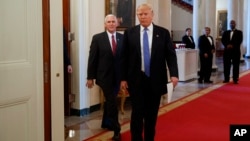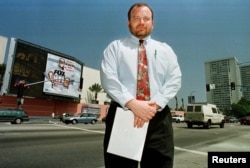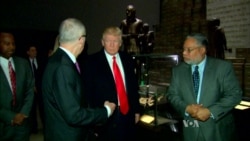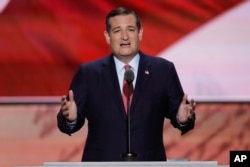U.S. President Donald Trump this week explicitly condemned anti-Semitism and the recent spike in anti-Jewish incidents reported since his inauguration.
Now some are pressing him to do same against anti-Muslim acts.
Speaking Tuesday, Trump called the anti-Semitic acts “horrible” and “painful,” and condemned “bigotry, intolerance, and hatred in all of its very ugly forms.”
The remarks followed public criticism that he had failed to forcefully condemn a series of bomb threats against Jewish community centers across the country and vandalism at a Jewish cemetery in St. Louis.
Vice President Mike Pence visited that cemetery Wednesday, joining in clean-up efforts and echoing Trump's condemnation.
“There is no place in America for hatred or acts of prejudice or violence or anti-Semitism,” he said.
Many Muslim Americans are now hoping the White House will take similar steps to address concerns about rising levels of anti-Muslim incidents across the country.
But they aren't optimistic.
“I don't expect him to,” says Shahed Amanullah, a tech entrepreneur and former State Department senior adviser in President Barack Obama's administration.
Part of that pessimism has to do with Trump's public statements on Islam, which have been much darker than those of his predecessors.
Early in the campaign, Trump proclaimed "I think Islam hates us." He also promised a "total and complete shutdown" of Muslims entering the U.S. — a proposal he later backed away from but which remains on his website.
Since becoming president, Trump has attempted to temporarily restrict immigration from seven Muslim-majority countries a ban he says is aimed at preventing terrorism. But many view it as a partial fulfillment of his campaign promise to ban Muslims.
Perhaps the bigger concern is that Trump has surrounded himself with several senior advisers who have explicitly embraced anti-Islam views, says Ibrahim Hooper, national communications director of the Council on American-Islamic Relations.
“It's a great concern to us that he continues to employ some of the nation's most notorious Islamophobes in the White House,” Hooper told VOA.
Trump aides
Hooper specifically points to Trump's chief strategist and former Breitbart News executive, Steve Bannon, who has long portrayed the West as being at war with political Islam.
Breitbart News is an iconoclastic far-right website embraced by some in the so-called “alt-right” movement, which includes a mix of racism, white nationalism and populism.
During his time as a Hollywood filmmaker in the mid 2000s, Bannon produced a script of an unreleased documentary-style movie that depicted Muslims taking over America and planting an Islamic flag on the U.S. Capitol.
In 2010, Bannon declared “Islam is not a religion of peace Islam is a religion of submission.” Just over a year ago on his Breitbart radio show, Bannon warned of the danger of Muslim immigration, saying the U.S. is the “wrong place” for “sharia-compliant” Muslims.
Michael Flynn, who served as Trump's first national security adviser, tweeted last year that “Fear of Muslims is RATIONAL.” Flynn was forced to resign earlier this month, but for reasons unrelated to those comments.
Stephen Miller, a Trump senior adviser, and Sebastian Gorka, a deputy assistant to the president, have also frequently depicted the fight against Islamic terrorism in religious terms.
White House officials reject the notion that those comments reflect prejudice against Muslims.
“Recognizing the threat of radical Islamic terrorism doesn't make you anti-Muslim,” White House spokesman Michael Short told VOA, adding: “Get serious.”
Short also pointed to Trump's comments earlier this week “condemning bigotry in all its forms and his desire to unite the country.”
Different approach
The Trump administration's rhetoric on Islam goes against the counterterrorism strategy embraced by U.S. administrations since the September 11, 2001, terror attacks.
In the aftermath of those attacks, President Bush insisted “Islam is peace” and said the acts of violence “violated the fundamental tenets of the Islamic faith.”
Watch: Muslim-Americans Ask President Trump to Address Their Concerns
Former President Barack Obama was hesitant to even use the words “radical Islamic terrorism,” arguing that it painted Muslims with a “broad brush” and risked bolstering the narrative of extremists that insist on a battle between the West and Islam.
“We are not at war with Islam,” Obama said during a 2015 summit on violent extremism. “We are at war with people who have perverted Islam.”
Tamara Sonn, a professor at Georgetown University's Center for Muslim-Christian Understanding, argues that Trump seems unwilling to make that distinction.
“And that runs the risk of lending credibility to terrorists, who are trying to convince other Muslims that the West is, indeed, at war with Islam,” she says.
But Trump's willingness to use the phrase “radical Islamic terrorism” has pleased many conservatives, including Republican allies in Congress, who see it as evidence that Trump is serious about the war on terror.
“This potent threat to our civilization has intensified under the Obama administration due to the willful blindness of politically correct policies that hamper our safety and security,” Senator Ted Cruz said in a statement last month.
“It is time to call this enemy by its name and speak with clarity and moral authority,” he added.
Rise in anti-Muslim incidents
The debate isn't just political, it has practical implications, both in terms of foreign policy and at home, where there's been a spike in reported cases of religiously motivated crimes against Muslims.
The number of anti-Islam hate groups in the U.S. nearly tripled during the past year growing from 34 in 2015 to 101 in 2016, according to a report last week by the Southern Poverty Law Center, which tracks hate groups.
But there are also signs of a countervailing trend.
According to a series of polls by the University of Maryland, public attitudes toward Muslims steadily improved during the year-long presidential campaign, even at a time when public rhetoric about Islam was unusually heated.
In November 2015, 53 percent of respondents said they had a positive view of “Muslim people.” Nearly a year later, that figure had increased to 70 percent.
“Even as Islamophobia has been mainstreamed in America, we've also seen the fight against Islamophobia be mainstreamed,” says Amanullah, who is confident about the future for American Muslims.
“I will put my faith in the Constitution and my neighbors any day of the week,” he says.










